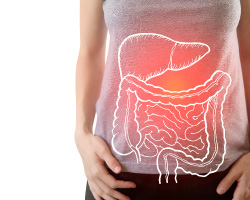
Gastroenteritis is an inflammation of the stomach and intestines. It's very common and extremely contagious, according to the National Institute of Diabetes and Digestive and Kidney Diseases (NIDDK).
It can also be very unpleasant. It often involves several days of watery diarrhea and vomiting and may also cause headache, fever and abdominal pain.
Causes
Gastroenteritis is caused by a number of viruses, including norovirus, rotavirus and adenovirus.
According to the NIDDK, ways to pick up the virus include:
- Through contact with an infected person.
- Through contaminated food or drink.
- By touching an infected surface and then touching your mouth. Some virus strains can live for months on surfaces.
- By sharing food, beverages or eating utensils with an infected person.
- By ingesting tiny contaminated particles that become airborne when an infected person vomits.
- By eating raw or undercooked shellfish harvested from contaminated waters.
Outbreaks of the disease can occur in schools, child care centers, nursing homes, dormitories, restaurants, cruise ships—anywhere people gather.
Complications
Thankfully, gastroenteritis is rarely serious. Symptoms commonly go away without treatment, according to the NIDDK.
Gastroenteritis can lead to bigger problems, though, for those unable to adequately replace fluids that are lost due to diarrhea and vomiting. Children, people with disabilities, the elderly and those with a weakened immune system are at increased risk for dehydration.
Signs of dehydration in adults include excessive thirst, infrequent urination, dark colored urine and dry skin.
Signs of dehydration in babies and young children include dry mouth and tongue, lack of tears when crying, no wet diapers for three hours or more, high fever, unusually cranky or drowsy behavior, sunken eyes or sunken cheeks.
Severe dehydration may require intravenous fluids and hospitalization, according to the NIDDK.
Treatment
It's important to remember that gastroenteritis is a viral infection, so antibiotics won't help. But there are some remedies available to ease symptoms and help prevent dehydration.
Adults may get some relief by drinking plenty of fluids and taking over-the-counter medications such as loperamide (Imodium) or bismuth subsalicylate (Pepto-Bismol). These medicines are not recommended for children, according to the NIDDK.
Children, due to their smaller body size, are more prone to dehydration than adults. They may need an oral rehydration solution, such as Pedialyte.
Talk with your doctor if you see signs of extreme dehydration, severe gastroenteritis symptoms that last more than a few days or blood in the stool.
Prevention
To prevent gastroenteritis, the Centers for Disease Control and Prevention (CDC) recommends frequently washing your hands and thoroughly disinfecting surfaces. Also avoid food or water that may be contaminated.
Vaccines are available to help protect children against rotavirus. The vaccines are given shortly after a child's birth along with other vaccines, according to CDC. Talk with your doctor about what vaccinations your child may need.
Reviewed 6/20/2023